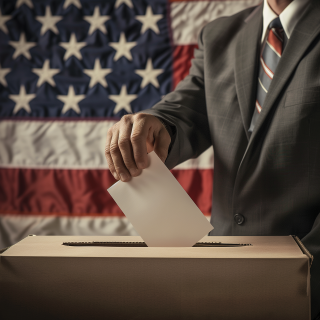Politics
Watching Out for Sexism on the Campaign Trail
Can Kamala Harris navigate the minefield of gender bias?
Posted August 2, 2024 Reviewed by Tyler Woods
Key points
- Female politicians regularly face gender bias on the campaign trail.
- Bias against Kamala Harris is likely to intensify, but may differ from Hillary Clinton in 2016.
- Avoid bias by making direct comparisons between the candidates on the same leadership criteria.
Vice President Kamala Harris is now the presumptive nominee for the Democratic ticket in the U.S. presidential election. In the lead-up to November, undecided voters will be scrutinizing her actions as VP and California's Attorney General, and they will want to know whether her policy record aligns with their own values.

As psychologists, we also know that her record will be filtered through a lens of gendered assumptions, biases that usually result in a higher bar for women’s advancement into leadership. Sometimes, this manifests as blatant discrimination—but more often, the bias is subtle or ambiguous.
As we prepare for November, let’s review what we know about the biases faced by women seeking positions of leadership and influence. What are the subtle signals of gender bias that we might hear in the political rhetoric, and even in our conversations with friends, family, and work colleagues?
Bias Against Power-Seeking Women
The first assumption to overcome is that women are not cut out for politics. Cultural stereotypes tell us that men are assertive and competent, while women are warm and likeable. This results in gender bias because our beliefs of what it takes to be a good leader fit better with masculine stereotypes. In the absence of clear information, our stereotypes fill in the gaps, resulting in a bias against would-be female leaders. So, while an engaged voter may know about a female candidate’s experience and capability, a casual voter may fall prey to the assumption that she is not knowledgeable enough and/or strong enough to lead.
However, when you are a contender for U.S. president, voters may recognize that only a strong, confident, and capable woman would rise to that level of leadership. That’s when the bias shifts, and people start to characterize capable female leaders as “cold” and “bitchy”—they are punished for violating gender expectations by being assertive and apparently lacking in warmth and sensitivity.
To illustrate how political power-seeking can generate disdain for women, we ran two studies where we compared voter reactions to bios of male and female political candidates (Okimoto & Brescoll, 2010). The information provided was identical, varying only the candidate names to indicate their gender. Results revealed that when the female candidate expressed a desire for power, she was evaluated as less warm and elicited greater feelings of anger and disgust, which led to lower voting preferences compared to the equivalent male candidate. Female politicians are often keenly aware that being assertive comes at a cost, with research showing that the most powerful women in the U.S. Senate do not talk as much as their male counterparts in order to avoid this backlash.
There are other domains where female politicians are held to a higher standard than their male counterparts. Perhaps the most common is physical appearance. Yes, the late-night comedians will often take a low blow at Former President Trump’s hair and hue; but Hillary Clinton had to wear pantsuits regularly to avoid news headlines about her wardrobe. In New Zealand, the media had a special name for the local party race between Jacinta Ardern (eventual Prime Minister of New Zealand) and Nikki Kaye—“the battle of the babes"—which occasionally included jokes about jelly-wrestling. Such objectification of female politicians is common, typically with negative outcomes for the female target.
Parental capability is another standard on which female political candidates are judged. The strong assumption that women prefer to be family-oriented (and should be family-oriented) certainly shapes how they are perceived—mothers are often seen as less competent than fathers (i.e., the motherhood bias), and those who choose to work full-time are characterized as bad mothers (i.e., the bad parent assumption). Male politicians are rarely asked about how they balance their family demands, but female politicians are regularly questioned. Former Australian Prime Minister Julia Gillard even received criticism for being childless, including national news articles on her “barren behavior.” What do you think the top Google autofill is for “does Kamala Harris…”? That’s right, it’s “have children”.
Finally, cultural stereotypes also paint women as more emotional than men. This expectation can be detrimental for female leaders, particularly if their emotion can be interpreted as hubris. But it’s a double-edged sword because even lacking expressiveness can come with negative consequences. Notice how Hillary Clinton was characterized as cold and emotionless, but as soon as she showed emotion on the campaign trail, she was called “inauthentic” and “manipulative”.

The Case of Kamala Harris
Clearly there are a wide array of issues that Vice President Harris might be confronted with in the next few months, but I suspect she has encountered (and successfully navigated) these issues in her previous runs for public office. How might these issues affect her particular case?
During her tenure as district attorney, Harris developed a reputation for being “tough on crime.” Although this is a meaningful issue that may affect voter preferences, it is also relevant to stereotypical expectations. It may aid Harris in avoiding any perceptions of weakness (i.e., being too sensitive) and tough enough for the Presidency (i.e., sufficiently assertive). So, she may “fit” the attributes needed for leadership. But what about the backlash? Will she be maligned for being “too tough”?
Here is where her case begins to diverge from what we may have seen in Hillary Clinton’s run. Kamala Harris is a woman of color, and research shows that these stereotypes may differ with intersectionality, most notably the presence of the angry black woman stereotype. When Harris expresses anger, people will be more likely to attribute it to her disposition rather than situational cues (like a belligerent debate opponent). As already discussed, perceptions of emotionality are often seen as a risk for leadership decision-making. Back in 2020, Trump attempted to paint Harris as “mad” and “angry”—more recently, he said her laugh suggests that she is “crazy”.
Interestingly, however, this stereotype may help her to avoid the backlash experienced by Hillary Clinton. Research shows that Black female leaders do not experience the same penalties for showing dominance compared to what we observe for White female leaders. Being assertive is aligned with the Black female stereotype, effectively reducing the expectancy violation.
Seeing Through the Bias
As the Presidential race heats up, how can we shine a light on this bias? Well, calling people out as sexist probably isn’t going to help. Instead, try to encourage direct one-to-one comparisons between the candidates (just like we do in research). This helps to avoid shifting standards by making sure both candidates are being held to the same level of scrutiny on the same set of leadership criteria. When you hear the assumptions creeping into the conversation, let that be your cue to place Harris and Trump side-by-side. After all, this is a race, and we all want the best candidate to win without the handicap of mistaken assumptions.
References
Okimoto, T. G., & Brescoll, V. L. (2010). The price of power: Power seeking and backlash against female politicians. Personality and Social Psychology Bulletin, 36(7), 923-936. https://doi.org/10.1177/0146167210371949
Gillard, J., & Okonjo-Iweala, N. (2020). Women and leadership: Real lives, real lessons. Australia: Vintage Books.




